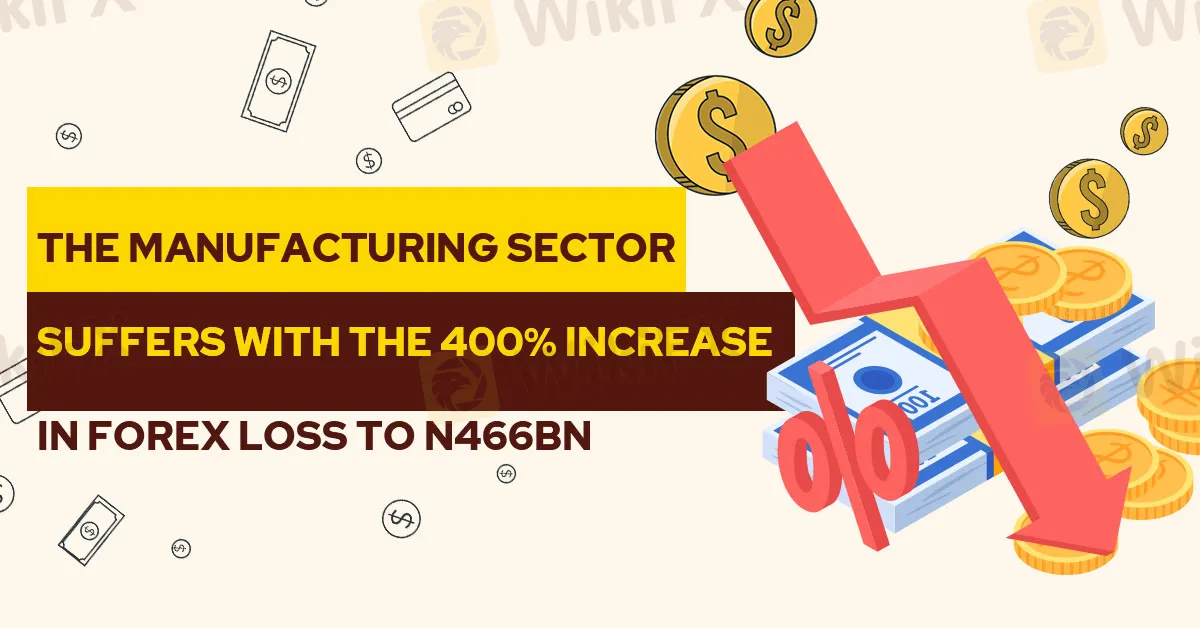Abstract:The industrial sector was severely impacted by the foreign exchange market regime, as evidenced by a 400% increase in net foreign exchange loss to N466 billion in the nine months that ended in September.

The industrial sector was severely impacted by the foreign exchange market regime, as evidenced by a 400% increase in net foreign exchange loss to N466 billion in the nine months that ended in September.
Industry participants stated that, among other unfavorable events, the loss of the oil subsidies and the conflict between Russia and Ukraine have increased pressure.
The operators said that losses from exchange rate revaluation are the reason the industry is currently bleeding from several places.
The financial reports of the top 17 manufacturing companies listed on the Nigerian Exchange Limited (NGX) revealed that although their gross earnings increased in tandem with product price increases, their profits plummeted due to various pressure points that undermined their financial stability.
Financial Vanguard obtained data from the Exchange's large manufacturing firms' financial statements, which revealed a net foreign exchange loss of N466.02 billion for the nine months ending in September 2023 (9M'23). This represents a significant increase of nearly 400% from the N93.219 billion loss reported in 9M'22.
The information revealed that although the companies' combined gross earnings increased by 23.4% to N4.4 trillion in 9M'23 compared to N3.6 trillion in 9M'22, their combined profit before taxes, or PBT, decreased by 24.6 percent to N505.148 billion in 9M'23 compared to N670.089 billion in 9M'22.
The rising cost of producing consumer items, the majority of which are necessities that households use on a regular basis, reflects the trend.
Foods and drinks, toiletries, over-the-counter medications, cleaning and laundry supplies, plastic items, and personal care items are a few examples of these.
According to research by Financial Vanguard, although the companies raised the prices of their goods in reaction to inflationary pressures on their operational costs, this has led to a decline in customer loyalty from consumers whose income has also been negatively impacted by inflation.
They now have to halt some production lines or reduce output below break-even levels due to the combination of the circumstances, losses they reported in foreign exchange revaluation, and the rising exchange rate.
The National Bureau of Statistics (NBS) reported that Nigeria's inflation rate ended the third quarter of 23 at 26.72%. Since then, the percentage has increased to 27.3% as of October 2023, and it is expected to continue rising this month, maybe through the end of the year.
Additionally, after the Central Bank of Nigeria (CBN) implemented foreign exchange reforms in mid-June, the value of the Naira relative to the US dollar fell to N832.32/US$ at the conclusion of the first nine months of 2023, from N448.04/US$ at the beginning of the year.
Withdrawal of foreign manufacturing investors
Due to a prolonged lack of foreign cash, Cadbury Nigeria's management was forced to raise prices in order to cover costs associated with the purchase of raw materials.
The same is true for GlaxoSmithKline, or GSK, in Nigeria, but this has already shown to be unsustainable, leading the business to declare that GSK UK Group, its parent firm, intends to discontinue manufacturing activities there. The company also stated that it would investigate the possibility of its medicinal items being distributed directly to third parties.
Another global consumer products business, Unilever Nigeria, has stopped producing its skin-cleansing and homecare brands.
Procter & Gamble (P&G), an American multinational company that produces fast-moving consumer goods (FMCGs), stated just last week that it would be ending its production activities in Nigeria because of the unfavorable working conditions there.
Bleeding blue chips
The majority of multinational corporations, or “blue chip” manufacturing enterprises, were more severely hit by FX revaluation losses.
Nestle Nigeria is leading the pack in this hardship, as it saw its profitability decline by N127.5 billion due to a foreign revaluation loss. As a result, the company reported a N56.7 billion loss before taxes in 9M'22, compared to a N58.4 billion profit. This is true even though the company's total earnings increased by 18.9% in 9M'22 to N396.6 billion from N333.5 billion.
It appears that Dangote Cement's massive N99 billion FX revaluation loss has tempered any potential super profit in the 9M'23. However, in the face of a jump in total earnings to N1.5 trillion in 9M'23 from N1.2 trillion in 9M'22, it made an unexpected 20.5% increase in profit to N404.9 billion compared to N335.900 billion in 9M'22.
Nigerian Breweries' profitability was hurt by a N86.8 billion forex revaluation loss, and the massive beverage multinational reported a total loss of N78.2 billion for the quarter, even though its gross earnings increased by just 2.1% to N401.7 billion from N393.3 billion.
“We may see a direct transfer in the cost differential going forward as most manufacturers will have no choice but to pass this cost to the final consumer which will eventually lead to lower sales volume and probably lower profitability for the company,” he stated. This would also result in a decrease in economic activity since consumers' purchasing power would be weakened by ongoing price increases, which would also reduce overall consumption. In order to help businesses plan and create incentives for some vital industrial businesses, the government will need to figure out how to stabilize the foreign exchange market. This will help to keep these businesses viable.










